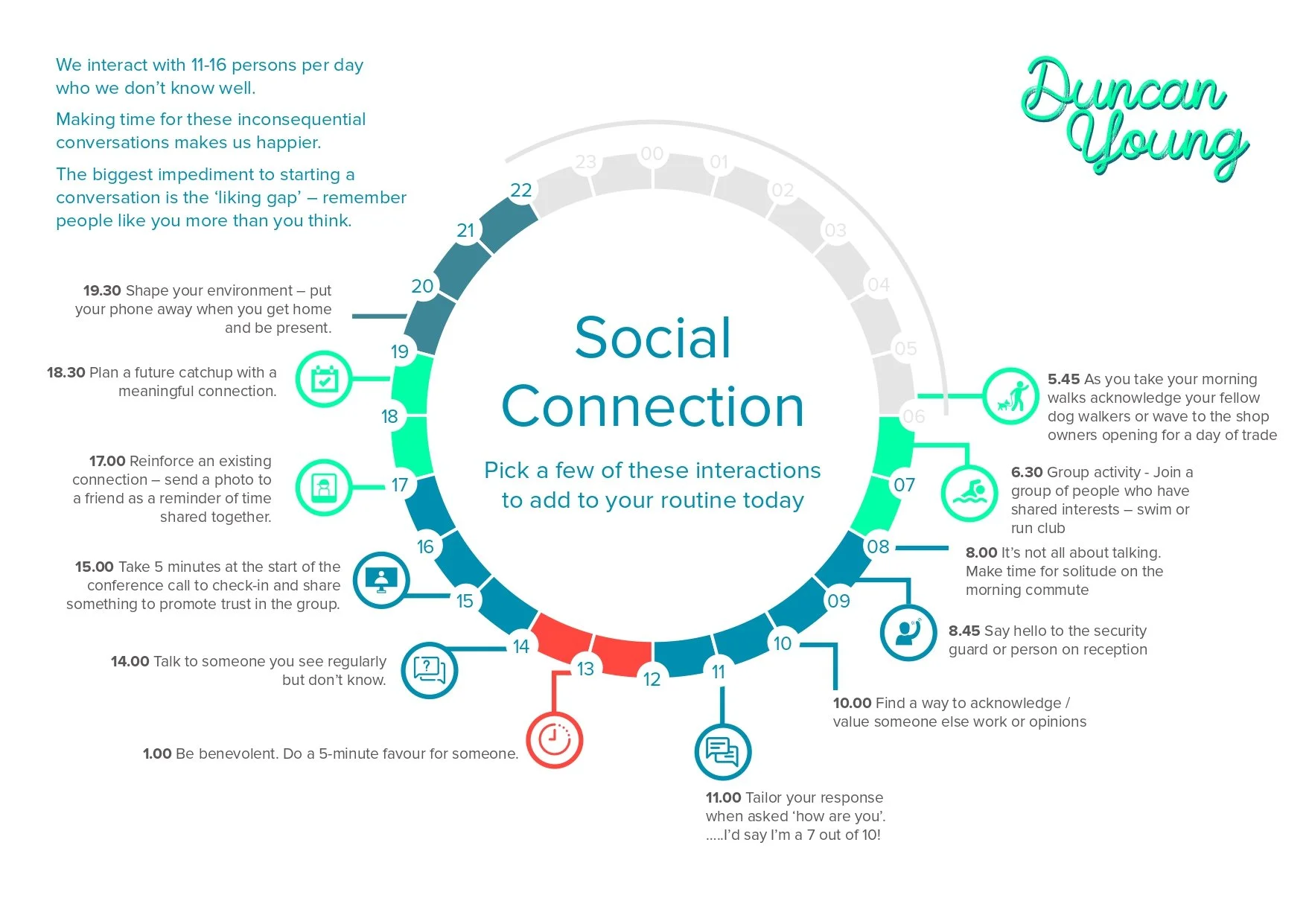RUOK Day 2025
Every September, the RUOK day organisation encourages us to reflect on and have conversations about our mental health, with this year’s theme being ‘I’m here to hear.’
In this post, we’re going to explore the important - but often neglected - topic of social connection. Just like exercise and healthy reading, a substantial and growing body of research suggests that a healthy social network is critical to good health.
In the last few years, I’ve had the pleasure of interviewing many experts to understand the importance of connection and community on our overall wellbeing. One thing all these conversations had in common was an acknowledgement of the struggle of maintaining healthy social lives in the modern world.
However, there’s hope - thankfully, all the experts I spoke to also shared simple steps we can take to improve our relationships.
The Science Behind Socialising
Many leading health organisations agree that a healthy social life is key to longevity. Here are a few of the studies you should know about:
The World Health Organisation notes that being able to contribute to our communities is key to health.
Meanwhile, the data in the World Happiness Report, an annual survey of 150 countries using the Gallup World Poll, suggests that social support is integral to the countries that top the report each year.
Studies into “Blue Zones” (areas with the most significant amount of octogenarians) suggest social connections are key.
The Harvard Grant Study found that the number one determinant of our life satisfaction, aka happiness, is the strength of our social connections.
So, why is socialising so critical to long-term health?
Research shows that people with strong connections tend to have a healthier lifestyle, such as eating healthier and engaging in physical activities. The stress of loneliness affects our immune systems, making it harder for us to fight off illnesses and diseases.
The good news is that wellbeing is modifiable.
Research suggests that 40% of premature death is affected by lifestyle, with 15% affected by social connections. Of course, genetics and environment also play a role, but there are things we can change to give ourselves the best chance possible at health and happiness.
How To Improve Your Social Connections
Unfortunately, all the competition for our time makes it harder to focus on social connections. Community participation has been declining for decades.
Climb the pillar of communication.
Improved wellbeing habits begin with small, intentional steps, and one powerful way to nurture your social biome is by considering where you are on the “Ladder of Communication” so you can prepare for the most appropriate step forward.
If you’re at the bottom of the ladder, you’re feeling isolated. You may feel lonely, without many strong connections, and also feel detached from your wider community.
In the middle, you have some good connections but feel detached from your wider community.
At the top of the ladder, you’re enjoying a balance of close bonds and broader community ties, and benefit from a rich network of small and meaningful interactions throughout the day.
By understanding our starting point and making small, consistent efforts to strengthen relationships, we can gradually climb the ladder, fostering deeper connections, meaningful interactions, and a stronger sense of belonging.
For example, someone at the bottom of the ladder might make a note to arrange a phone call with an old friend or lunch date with a colleague - and be intentional about it by placing a time and putting it in your diary. Or simply be more proactive about replying to text messages.
In the middle, you might start getting to know your neighbours or joining a community event, while those at the top might reach out to those more isolated or arrange events to bring more people together.
Where on the ladder are you, and how can you climb it? How can you move closer to the top and deepen your connections?
Be kind
The World Happiness Report shows that benevolence, including the kindness of strangers, is key to wellbeing. This includes knowing who you can call in a crisis and that you can count on people around you.
Benevolence can help us feel a sense of belonging within our neighbourhoods.
Simple ways to be kinder include actions such as helping strangers with small actions (opening doors, helping an elderly neighbour by walking a dog, speaking to a more socially isolated coworker), local volunteering, and donations (which have all seen an increase post-pandemic).
Remember, the pillars of wellbeing are interconnected.
These pillars include physical, mental, social, career, financial and spiritual wellbeing. That might seem like a lot of areas to cover, but, fortunately, many of these are interrelated.
For example, I swim every morning at Manly Beach - this doesn’t just help improve my physical wellbeing, but also my mental and social wellbeing, as I get to know the other swimmers and achieve personal goals. Even the morning sunlight is beneficial to our circadian rhythms.
So when planning social activities, think about how you can tick off more than one pillar at once. For example, rather than meeting at a cafe, why not walk through the park together before sitting down for coffee?
Small interactions can be meaningful.
Yep, studies show that small talk at work or with the local barista has a positive effect on your mood!
Fortunately, socialising is a skill that can be learned, even talking to strangers. A seemingly meaningless chat with your barista isn’t as meaningless after all; it is a genuine mood-booster. It can alleviate loneliness, boost cognitive performance (because it’s hard!), and give you a sense of belonging in your community.
So chat to your barista, get talking to locals at a place you visit already (such as the gym, a club, local park, or allotment), and don’t worry if he interaction feels awkward, as it takes time to learn this skill. Chatting to someone you have a shared interest with can make things easier (such as talking about running with people in your running club)
Use your calendar
We plan everything else in our lives - attendance at work, meetings, appointments - but tend to be far less diligent with our social events, whether inviting someone for dinner, going to a cafe or a walk, or even making a note of when you’ll pluck up the courage to talk to a stranger.
Ask Questions
According to Charles Duhigg, Super-communicators ask more questions—and more profound questions—why questions rather than what questions—are even better.
For example, ask ‘Why did you pursue your career?’ or ‘What do you like most about your job?’ instead of ‘What is your job?’
Ask people questions about themselves, listen to what they say and repeat them back in your own words to check you understood them correctly. This communication method, known as looping for understanding, helps people feel understood and cared for as you get to know them.
Make It A Habit
‘Each action is a vote for the kind of person you want to be.’ James Clear.
Every time you do something, it becomes more and more part of your personality - i.e., if you’re the kind of person who talks to strangers or helps people in need, or plans dinners to bring different people together, that will rub off on you and the people around you over time.
1. To make socialising a habit, start small. What tiny action can you take each day to make you feel connected to the world around you?
2. Habit stack - If you already have the habit of visiting a particular local cafe every Tuesday morning, you could habit stack by deciding that each time you visit, you will ask the barista how their day is going, or challenge yourself to talk to a stranger
3. Shape your environment - ie, put your phone away when you want to socialise. Or if you’re going to get to know your neighbours, take your earpods out and heighten your gaze before walking down the street.
Summary: Learning social skills can help all facets of your wellbeing
Deepening your network can help provide you with better opportunities in your career and finances. You will feel less isolated and thus mentally healthier, and your physical wellbeing will improve when you’re more likely to be invited to activities.
Building social connections into your everyday life can help improve your overall wellbeing. The ‘social biome’ concept describes the ecosystem of relationships and interactions and can be curated. Just as physical health depends on a balanced diet and exercise, social health depends on a balance of different types of connections
You can also use the social connection wheel for ideas for building social activity throughout your day. The graphic below displays your day as a wheel and demonstrates all of the opportunities to connect with others as we go through our daily routines.
Social Connection Wheel [Click to download PDF version]

